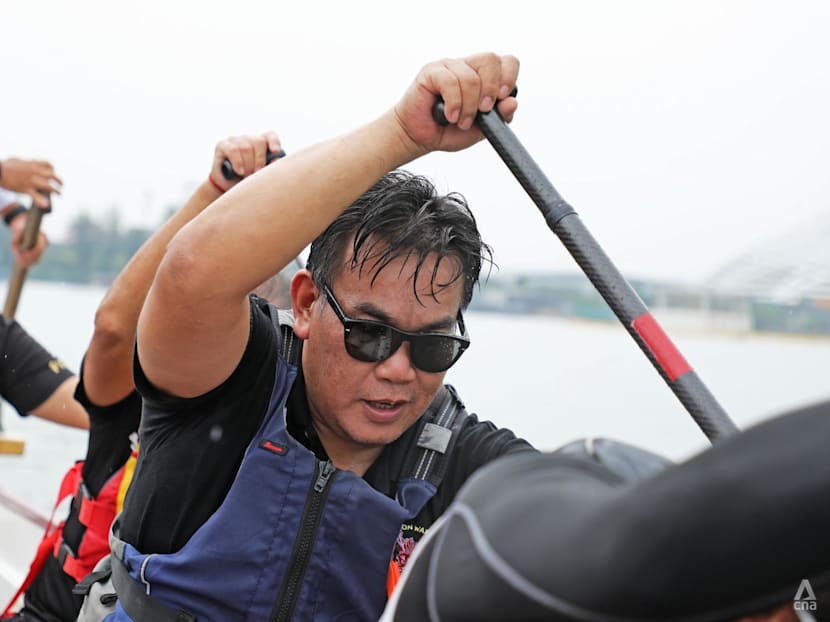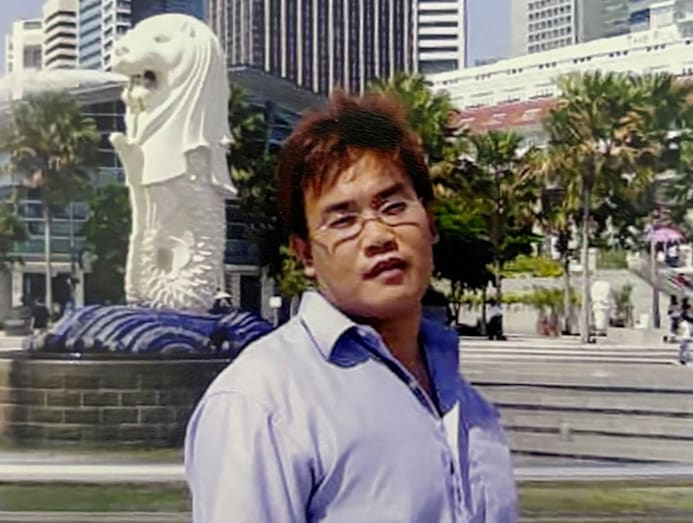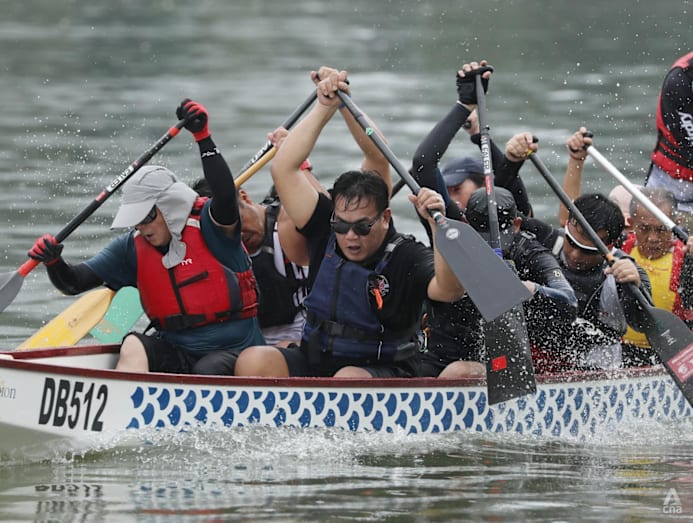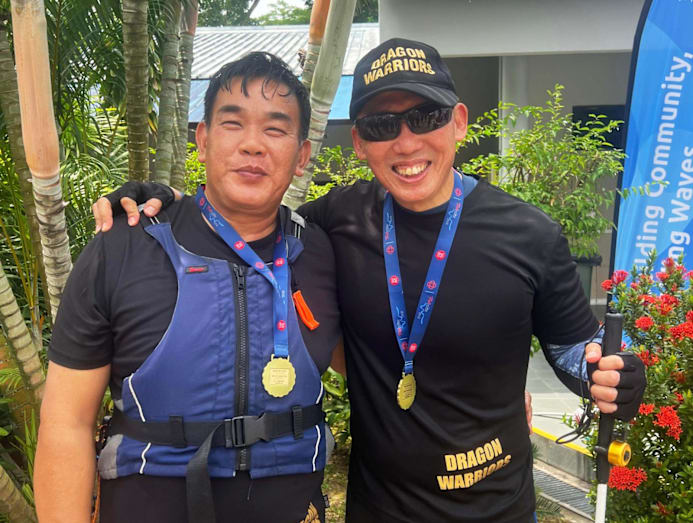I started losing my eyesight at 42, but I refused to let it slow me down
Once an avid swimmer and cyclist, Mr Lee Meng Poh unexpectedly started losing his vision in 2012. Here’s how he found comfort and fortitude in an unlikely pursuit - dragon boating.

Mr Lee Meng Poh pictured during a dragon boating training session on Sep 7, 2025. (Photo: CNA/Alyssa Tan)

This audio is generated by an AI tool.
I was exposed to a variety of sports from a young age. Basketball, shot put, ping pong, even swimming lessons in Primary 3 – these early experiences helped build my love for sports.
By the time I entered adulthood, sports had become an integral part of my life, a vital outlet for me to relieve stress and recharge.
Even while juggling two jobs as a gas deliveryman and a funeral worker in my thirties, I made time for swimming, cycling, basketball and badminton. Night swimming at the Yio Chu Kang Swimming Complex near my home, especially, helped me relax after the day’s demands.
But life took an unexpected turn in 2012, when I was 42.
My vision began to blur gradually, until all I could see were shadows and light. I had worn glasses since childhood, so I initially attributed the blurriness to lack of rest or my astigmatism.
However, during an annual eye check-up, I decided to raise the issue of worsening blurriness and shadows in my vision. The optometrist ran some tests, and it was immediately clear that my condition was more serious than I had thought.
After more comprehensive testing, I was diagnosed with retinitis pigmentosa, a hereditary condition that could cause progressive vision loss and, in time, potentially lead to total blindness. The doctor explained that there was no cure.

That period was difficult. I had to find ways to adapt to a world where I could no longer rely on my eyes.
Perhaps many would be too overwhelmed or daunted by such a serious diagnosis – but strangely enough, I was not afraid. Instead of withdrawing or retreating, I pushed myself to continue living as I always had.
I learnt to use a white cane to find my way around, and refused to restrict myself to staying at home.
The simplest things became big challenges – such as crossing the road. I relied on beeps emitted by traffic lights to guide me, but there were times when I encountered non-audible signals. I had learn to ask for help from pedestrians around me to know when it was safe to cross.
I also had to rely on my memory for day-to-day tasks such as commuting on public transport. I learnt by heart the stops along my most-used routes, and when buying meals, I had to make an extra effort to commit to memory the locations of my most frequented food stalls.
DRAGON BOATING – A DIFFERENT BEAST
During this time, it became even more important to me to stay active, not just physically, but mentally.
As I slowly adjusted to life with minimal eyesight, I scaled back dramatically on my sporting activities, turning instead to neighbourhood walks and simple exercises at fitness corners near my home.
To be honest, I struggled to find joy in these. My mind often went blank during these activities – they just didn’t engage me the same way a vigorous game of basketball or badminton did.
With no other alternatives available to me at the time, I could do little else but press on with these.
By 2019, at the age of 49, I could barely see anything. My field of vision had narrowed drastically – I had no peripheral vision left and could make out only blurry silhouettes of light ahead.
This was when a friend introduced me to dragon boating.
At first, I was apprehensive. I had grown used to navigating the world with my white cane, and with help from my wife and my smartphone’s accessibility features, I had learnt to manage daily life.
But dragon boating seemed like a different beast. Aside from swimming by myself, I didn’t have all that much experience with water sports. On top of that, I wasn’t sure how I would fit into a team.
Still, something about working together with others to achieve a common goal intrigued me. Despite my worries, I said yes.
My first training session was tough. I felt so overwhelmed by the sheer amount of coordination needed, and dragon boating seemed far more intense to me than other sports I’m more familiar with.
After that first session, I nearly gave up. But something about the experience intrigued and challenged me in a way I hadn’t experienced before, and I decided to keep pushing.
It wasn’t just the competition that drew me in, it was the camaraderie. My team included visually impaired paddlers like me, along with experienced volunteers. We have paddlers in their 30s all the way to those in their 70s and still going strong.
They helped me pick up the techniques, build strength and understand what it means to be part of a team, which is what makes dragon boating so special. Over time, I found myself learning to trust my teammates – but also myself.


A NEW CHALLENGE: THE OPEN SEA
This year, I began training for something new: my first open-sea dragon boat race, Waves of Unity.
Most of our training had been in calm reservoirs and lakes, so the open sea offered a whole host of new challenges for us. The water would be heavier, the wind unpredictable, and conditions could change in an instant. But that’s also what made it exciting.
Preparing for this race pushed me further than I had imagined, both physically and mentally.
On Aug 16, the day of the race, arriving at Pasir Ris beach felt so special and surreal. Reaching the open sea with my team had always felt like a milestone I never thought I would achieve – but now here we were, together.
My teammates described the scenery at the beach to me, and told me how beautiful it was. The smell of the seawater and the hint of salt in the air hit me hard and stayed with me. It was so different from our training sessions at the reservoir.
Just getting on our boat was a new experience in itself, as the waves were a little rougher and more volatile.
Amid the unpredictability, we kept paddling hard against the currents. Together, we crossed the finish line strongly to clinch the gold in the adaptive DB20 PA Community Open category.

We were overjoyed – but for me, that moment wasn’t just about the medal. It marked how far I had come.
When I first started going blind all those years ago, I’d spent a lot of time worrying about what I would lose. I never thought I would have so much more to gain.
Through dragon boating, I have gained physical strength and confidence – but more than that, I have found a supportive community. Here, I can share my struggles with others who face similar pains and challenges. Together, we encourage one another to keep paddling forward, no matter what.
In fact, I often say that life became more colourful after I lost my sight. This is something I’ve learnt after 13 years of learning to live without physical vision – the vibrancy of life is not found in what we can see visually, but in how we experience and appreciate everything around us.
JUST GETTING STARTED
People often ask me why I’m still dragon boating. The truth is, as difficult and strenuous as this sport is, I don’t see it as something I have to do; I truly enjoy it.
Every training session reminds me: My body still works. My spirit is still strong. I am capable of more than I once believed.
I am turning 55 soon. I’m still training weekly with my team at PAssion Wave @ Marina Bay, where we focus on building strength, coordination and unity.
Over the years, I’ve also been gratified to see efforts to make water sports more inclusive and accessible. For instance, PAssion Wave @ Bedok Reservoir recently introduced Singapore’s first barrier-free kayak launch point. Thoughtful features like this empower more people with mobility challenges to experience the freedom of being on the water independently.
Some tell me it is time to slow down – but I feel like I am just getting started.
The future may be uncertain, but one thing is clear: No matter how strong the wind and the waves may get, I will keep paddling.
Lee Meng Poh is a wellness therapist and an avid dragon boater.
If you have an experience to share or know someone who wishes to contribute to this series, write to voices [at] mediacorp.com.sg (voices[at]mediacorp[dot]com[dot]sg) with your full name, address and phone number.










